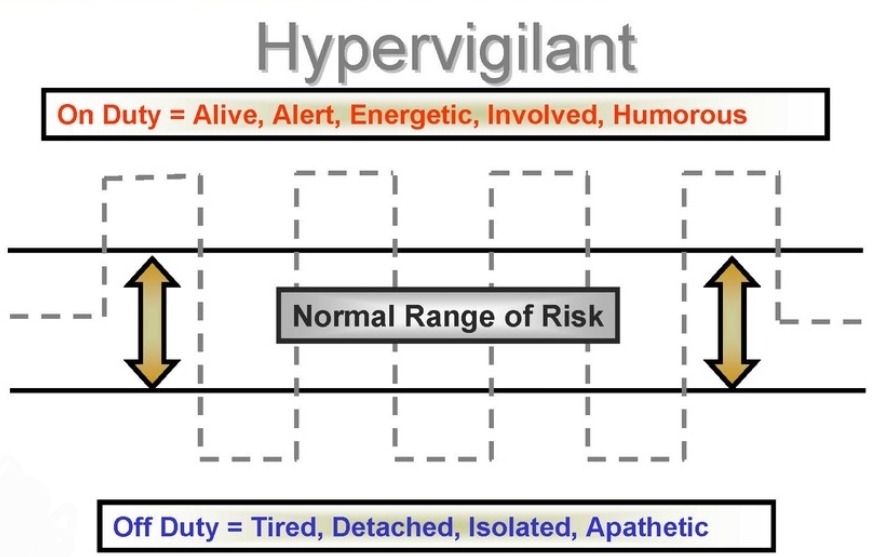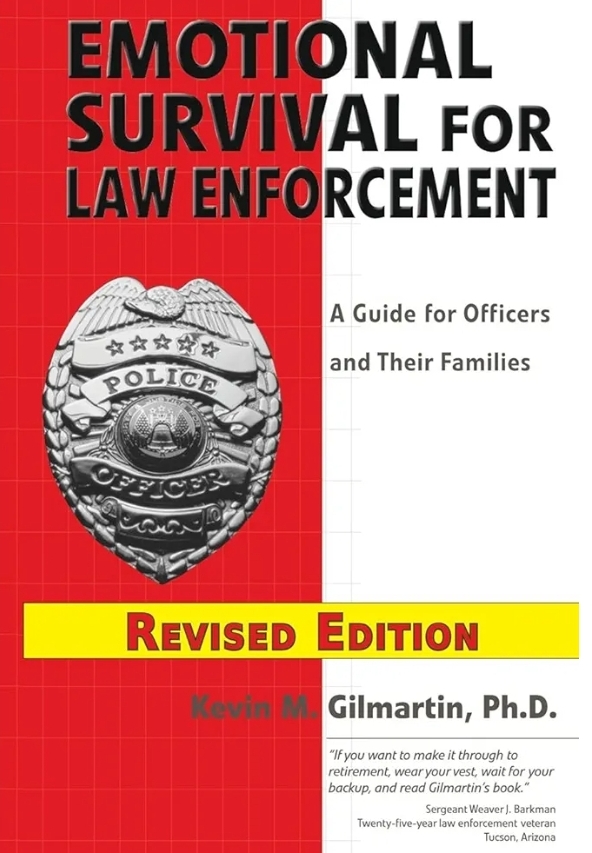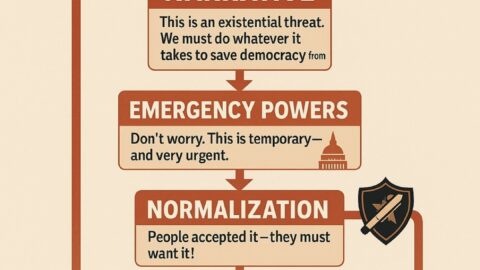Authors note: As a police officer, I came across this book and was able to attend the training. After leaving the profession, I believe this information is valuable for everyone today, as I have observed and experienced, the same concept in other fields and even in life in general. I believe the news cycle, politics, technology, and our culture have place humanity in a state of hyper vigilance. The end results have been “emotional withdrawal, apathy, and detachment in personal relationships,” politics and life in general. It also pushes humanity towards a victim-mindset.
“Emotional Survival for Law Enforcement: A Guide for Officers and Their Families” by Dr. Kevin M. Gilmartin – Overview and Key Insights
Author: Dr. Kevin M. Gilmartin
Focus: Emotional well-being and resilience for law enforcement officers and their families.
Purpose: To address the unique psychological and emotional challenges faced by police officers and provide strategies to maintain emotional health, relationships, and a balanced life.
Overview of the Book
Dr. Kevin Gilmartin, a behavioral scientist and retired police officer, explores the emotional and psychological toll of law enforcement careers. He highlights how the pressures, dangers, and stresses of the job can erode officers’ mental and emotional well-being over time. The book serves as a practical guide for officers and their families to recognize these challenges, understand their causes, and adopt strategies for emotional survival.
Key Themes and Concepts
a. The Hypervigilance Cycle
- Definition: Hypervigilance is a state of heightened alertness necessary for officer safety on the job.
- Problem: Off-duty, this hypervigilance can lead to emotional withdrawal, apathy, and detachment in personal relationships.
- The Biological Rollercoaster: The constant shift between high alertness (on duty) and emotional detachment (off duty) causes hormonal imbalances, particularly involving adrenaline and cortisol levels.

Impact: Officers may feel emotionally numb, exhausted, or irritable at home, leading to strained relationships and isolation.
Solution: Awareness of the hypervigilance cycle and actively engaging in activities that restore emotional balance, such as exercise, hobbies, or quality family time.
b. The Victim-Based Mindset
- Definition: Many officers adopt a victim-based mindset due to feelings of underappreciation, societal criticism, or the perceived futility of their work.
- Signs: Cynicism, isolation, and resentment.
- Impact: Officers may withdraw from their families, hobbies, and support systems.
Solution: Shift the mindset to self-awareness, accountability, and purposeful engagement in both personal and professional life.
c. Work vs. Home Identity
- Officers often develop a “work self” (authoritative, alert, decisive) and a “home self” (relaxed, emotionally available).
- The failure to transition between these roles leads to emotional disconnection at home.
- Many officers remain “on duty” mentally, even when off duty.
Solution: Actively create boundaries between work and home life and invest emotionally in family relationships and personal growth.
d. The Impact on Families
- Families often feel neglected, misunderstood, or emotionally disconnected from their loved ones in law enforcement.
- The officer’s emotional withdrawal can cause spouses and children to feel abandoned or undervalued.
- Families may also carry secondary trauma from hearing about or witnessing the officer’s stress or trauma.
Solution: Open communication, therapy, and family activities help bridge emotional gaps and maintain strong relationships.
Emotional Survival Strategies
a. Self-Awareness and Education
- Understand the emotional and psychological effects of law enforcement work.
- Recognize triggers, warning signs, and patterns of emotional withdrawal.
b. Build Emotional Resilience
- Practice emotional self-regulation techniques like mindfulness, meditation, or journaling.
- Engage in stress-reducing physical activities.
c. Prioritize Relationships
- Make family and relationships a non-negotiable priority.
- Share feelings and experiences with loved ones instead of bottling them up.
d. Develop Healthy Coping Mechanisms
- Avoid unhealthy habits like alcohol abuse, emotional isolation, or excessive screen time.
- Focus on hobbies, faith, or volunteering.
e. Seek Professional Help
- Counseling and peer support groups can be valuable tools for emotional recovery.
- Mental health professionals familiar with law enforcement culture can provide tailored support.
The Role of Leadership and Departments
- Agencies must prioritize officer well-being as part of their organizational culture.
- Implement mental health training, wellness programs, and counseling services.
- Encourage open conversations about emotional health without stigma or fear of career repercussions.
Why This Book Matters
- Practical Guidance: Real-world strategies for officers to regain control of their emotional health.
- Family Focus: Acknowledges the critical role of families in an officer’s emotional resilience.
- Prevention vs. Reaction: Encourages proactive mental health habits instead of waiting until burnout or breakdown occurs.
- Holistic Approach: Addresses physical, emotional, and relational well-being.
Key Takeaways
- Understand the Hypervigilance Cycle: Learn to balance on-duty alertness with off-duty emotional engagement.
- Avoid Cynicism and Isolation: Stay connected to family, friends, and positive influences.
- Prioritize Self-Care: Emotional health is as crucial as physical health.
- Seek Help When Needed: Therapy and peer support are signs of strength, not weakness.
- Balance Work and Home Life: Create boundaries and actively invest in relationships.
Final Reflection
“Emotional Survival for Law Enforcement” is not just a guide but a wake-up call for officers, families, and departments to address the emotional toll of policing. Dr. Gilmartin’s insights emphasize the importance of self-awareness, emotional intelligence, and proactive well-being.
Quote from the Book:
“You cannot serve others if you are emotionally and mentally depleted. Prioritize your well-being—it’s not just for you, but for everyone you care about.”
For law enforcement officers and their families, this book serves as an essential blueprint for emotional survival, personal fulfillment, and building lasting relationships in the face of unique professional challenges.






